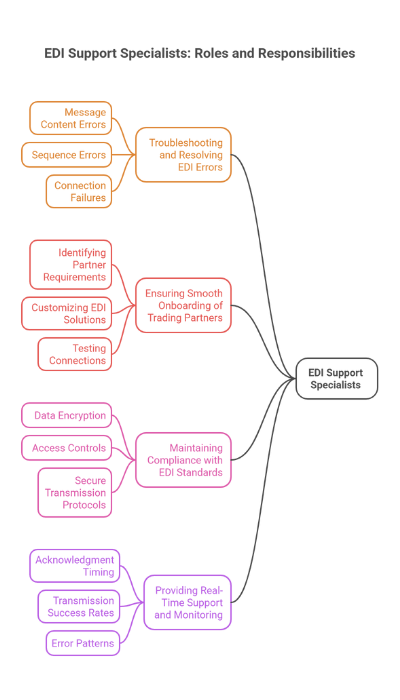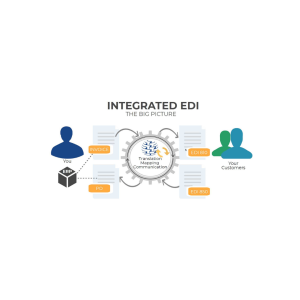Introduction
EDI support has revolutionized supply chain management, driving efficiency, accuracy, and speed across industries.
When businesses implement real-time data exchange through EDI, key players in the supply chain receive prompt updates about inventory levels, shipping schedules, and payment status.
What makes EDI in supply chain management so powerful?
For starters, these automated transactions can be processed in minutes—compared to days or weeks with traditional paper methods.
Additionally, supply chain EDI minimizes human error, speeds up delivery, and makes doing business easier for everyone involved.
This is particularly important as the demand for faster, more accurate deliveries continues to grow.
Key Takeaways
- EDI delivers massive cost savings: Transaction costs drop from $30+ per paper order to under $1 with EDI, while the UK grocery sector alone saves £650 million annually through automated processes.
- Error reduction drives efficiency: EDI eliminates manual re-keying errors and processes orders in minutes instead of days, with 5-25% of inbound orders experiencing preventable problems without proper support.
- Strategic implementation requires cross-functional planning: Success depends on thorough assessment, choosing industry-experienced providers, integrating internal teams, and investing in comprehensive staff training.
- Real-time monitoring prevents costly disruptions: EDI specialists provide 24/7 support, proactive error resolution, and partner onboarding that can be completed in hours rather than months.
- Customer satisfaction translates to revenue growth: Companies with high satisfaction levels achieve 6% higher operating margins and up to 15% revenue growth through improved partner relationships.
What Is EDI Support and Who Needs It?
Defining EDI Support Services
EDI support services involve specialized assistance that helps organizations implement, maintain, and troubleshoot their electronic data exchange systems. These services typically include connectivity management, trading partner onboarding, transaction monitoring, and technical issue resolution.
An EDI service provider offers software-as-a-service technology that synchronizes with tens, hundreds, or even thousands of other companies’ business processes and rules. These providers facilitate seamless data transmission, compliance, and automation for businesses of all sizes, ensuring companies can focus on core operations rather than technical EDI challenges.
Furthermore, comprehensive EDI support includes 24/7/365 assistance, proactive monitoring, and handling requirement changes without additional costs. This level of service proves invaluable for organizations that lack in-house EDI expertise or need to manage complex partner relationships.
Industries That Rely On EDI Support
EDI works across numerous sectors, providing quick turnaround times, data security, operational efficiency, and increased revenue. Some key industries include:

- Retail and Consumer Goods: Critical for supply chain management, order fulfillment, and inventory control
- Healthcare: Vital for claims processing, medical billing, and HIPAA compliance
- Automotive: Essential for just-in-time manufacturing and lean operations
- Transportation and Logistics: Optimizes freight management and supply chain coordination
- Manufacturing: Streamlines procurement and production planning
- Financial Services: Secures banking operations and payment processing
Notably, many companies have embraced EDI to automate and streamline their business processes across this diverse range of industries. The retail sector alone has been benefiting from EDI for many years, though many businesses still process orders and invoices using paper-based procedures.
When to Consider EDI Customer Support
Organizations should consider implementing EDI support when facing challenges managing their trading partners. Specifically, when order processing, forecasting, reporting, and item management become prohibitively complicated, EDI support becomes essential.
Consequently, businesses need EDI support when expanding their trading partner network, as each partner typically has different business rules for required EDI documents, testing procedures, and connection methods.
EDI support is necessary for ensuring data security through authentication and encryption controls. Moreover, companies should seek EDI assistance when implementing critical business models like Just-In-Time inventory management, which requires accurate, real-time data exchange to function properly.
How EDI Support Specialists Help Your Supply Chain
Supply chain interruptions can cost businesses thousands of dollars per hour in lost productivity and sales. EDI support specialists serve as the frontline defense against these costly disruptions, ensuring your electronic data flows smoothly between trading partners.

1. Troubleshooting and Resolving EDI Errors
EDI errors happen even in well-designed systems and can significantly impact operations. Each EDI dispute requires approximately 2 hours to resolve, with 5-25% of inbound orders experiencing problems that could be prevented through proper configuration and validation. Support specialists identify and fix common issues, including:
- Message content errors from improper data formatting
- Sequence errors when messages arrive out of order
- Connection failures between systems
- Routing problems are causing lost transmissions
- Configuration issues in partner setups
Support specialists implement systematic error prevention through automated validation, thorough testing, and comprehensive monitoring systems that catch problems before they affect business operations.
2. Ensuring Smooth Onboarding of Trading Partners
EDI specialists transform partner onboarding from a months-long ordeal to a streamlined process. With a centralized EDI integration platform, trading partners can be set up for data movement within minutes, while EDI and XML data transformation takes just a few hours.
The specialist-led onboarding process typically follows six essential steps:
- Identifying partner requirements and needs
- Establishing clear communication channels
- Customizing EDI solutions for integration
- Testing connections and providing training
- Going live with the EDI connection
- Implementing ongoing monitoring and improvement
3. Maintaining Compliance with EDI Standards
Compliance specialists ensure your EDI system maintains high levels of security through data encryption, access controls, and secure transmission protocols. They help align your operations with trading partner requirements, which often include specific timelines – such as Walmart’s requirement that EDI 997 acknowledgments must be sent within 24 hours.
Support specialists regularly audit transactions to identify potential issues before they escalate into chargebacks or other financial penalties, thus protecting your bottom line while maintaining trading partner relationships.
4. Providing Real-Time Support and Monitoring
Real-time monitoring is rated important by 88% of EDI users, and specialists track critical performance indicators to ensure smooth operations:
- Acknowledgment timing to confirm document receipt
- Transmission success rates for purchase orders, shipping notices, and invoices
- Error patterns that might indicate systemic issues
By setting up real-time alerts and dashboards, EDI support specialists maintain visibility into supply chain health, allowing immediate action on issues as they arise. This proactive approach prevents the operational inefficiencies, missed orders, and inventory discrepancies that result from lost or failed EDI transactions.
Steps to Implement EDI Support in Your Organization
Implementing effective EDI support requires a structured approach and careful planning. Let’s examine how to make this process smooth and successful.
1. Assessing Your Current EDI Setup
First, evaluate your existing business processes to identify areas where EDI can bring improvements. Determine which EDI documents and transaction sets you need to support, including purchase orders, invoices, and shipping notices. During this phase, analyze your trading partners’ requirements and assess your technical readiness. This evaluation will help define the scope of your EDI support implementation and ensure alignment with business objectives.
2. Choosing the Right EDI Support Provider
When selecting an EDI provider, consider their experience in your industry rather than just the size of their partner network. Look for providers offering:
- Pre-implementation consultations
- Dedicated implementation support
- Robust ongoing technical assistance
- Comprehensive training options
Review their Service Level Agreement (SLA) for commitments regarding response times and service availability. Indeed, a provider’s ability to offer scalable solutions is key to your business’s growth.
3. Integrating Support with Internal Teams
Form a cross-functional EDI project team involving members from all relevant departments. This team should include technical, operational, and financial experts to enhance implementation. The EDI Coordinator must maintain communication with all sectors affected by the EDI program to ensure their support. Subsequently, establish clear responsibilities for each team member.
4. Training Staff and Setting Up Workflows
Invest in practical, interactive training exercises to enhance understanding and knowledge retention. Tailored training ensures users understand both technical and operational changes. Given that employees become more proficient through practical EDI training, they’re less likely to make costly errors when processing transactions.
Switch to Commport EDI Solutions Today. Save up to 70% in EDI costs. The most advanced EDI solution with built-in EDI transaction monitoring tools and reports makes implementation easier while ensuring you become 100% EDI compliant.
Measuring the Impact of EDI Support on Supply Chain Success
After implementing EDI support in your supply chain, measuring its impact becomes essential for justifying investment and identifying areas for improvement. Effective measurement demonstrates the tangible benefits of your EDI solution.
1. Tracking Order Accuracy and Fulfillment Speed
Once EDI support is in place, organizations typically see remarkable improvements in order accuracy. Automated data exchange eliminates manual re-keying errors, resulting in fewer incorrect shipments and disputes. Meanwhile, processing speed increases dramatically—tasks that once took days now complete in minutes, allowing for faster sourcing, fulfillment, and delivery.
2. Monitoring Cost Savings and Efficiency Gains
To calculate ROI, track these key metrics:
- Transaction cost reduction: Paper purchase orders cost over $30 each versus less than $1 for EDI transactions
- Labor savings: Example—two employees spending 10 hours weekly on manual order input at $25/hour saves $26,000 annually
- Error reduction costs: Include expenses from incorrect shipments, dispute resolution time, and retailer chargeback fees
The UK grocery sector alone identified potential savings of £200 million annually through full EDI implementation.
3. Evaluating Supplier and Partner Satisfaction
Companies with high customer satisfaction levels achieve operating margins up to 6% higher than those with lower satisfaction. According to McKinsey, B2B companies with good customer satisfaction see 10-20% reductions in cost to serve and up to 15% revenue growth. Eventually, this satisfaction translates into increased loyalty, repeat business, and brand advocacy.
Conclusion
EDI support stands as a cornerstone of modern supply chain management, transforming how businesses exchange crucial data with their partners. Throughout this article, we’ve seen how proper EDI implementation drives remarkable efficiency gains across multiple industries.
Businesses that embrace EDI support services gain significant competitive advantages. Most importantly, they benefit from faster order processing, enhanced accuracy, and streamlined partner relationships. EDI specialists play a vital role in this ecosystem by troubleshooting errors, facilitating partner onboarding, maintaining compliance, and providing real-time monitoring – all essential functions for keeping supply chains running smoothly.
Commport EDI Solutions - #1 EDI Solutions Platform
Need Help? Download: Commport's EDI Buyers Guide
Unlock the full potential of your supply chain with our comprehensive EDI Buyer's Guide — your first step towards seamless, efficient, and error-free transactions
Frequently Asked Questions
EDI support involves specialized assistance for implementing, maintaining, and troubleshooting electronic data exchange systems. It’s crucial for businesses as it streamlines supply chain operations, reduces errors, and significantly cuts transaction costs from over $30 per paper order to less than $1 with EDI.
EDI support is particularly beneficial for industries with complex supply chains, including retail and consumer goods, healthcare, automotive, transportation and logistics, manufacturing, and financial services. These sectors rely on EDI for efficient order processing, inventory management, and compliance with industry standards.
EDI support enhances supply chain efficiency by automating data exchange, reducing manual errors, speeding up order processing from days to minutes, and providing real-time monitoring of transactions. This leads to improved order accuracy, faster fulfillment, and better partner relationships.
When implementing EDI support, companies should assess their current setup, choose a provider with industry-specific experience, integrate support with internal teams, and invest in comprehensive staff training. It’s also important to establish clear metrics for measuring the impact on supply chain success.
Businesses can measure the ROI of EDI support by tracking key metrics such as reduction in transaction costs, labor savings from automated processes, decreased error rates, improved order accuracy, and increased partner satisfaction. The UK grocery sector, for example, identified potential annual savings of £200 million through full EDI implementation.





